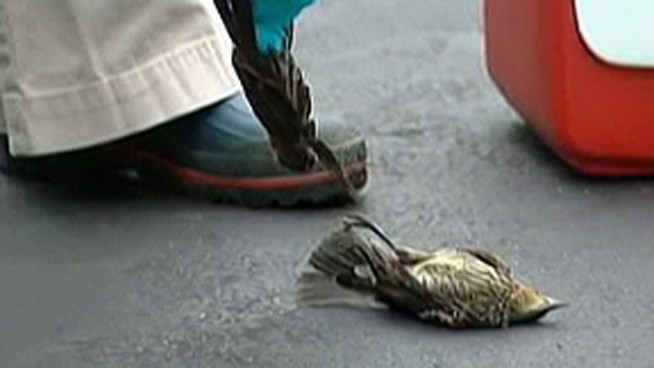
The scientists' report, published this week in the journal Nature, gave the oceans an overall score of 60 on a scale of 0 to 100. Among the world's 133 countries with ocean coastlines, scores ranged from 36 to 86; the United States scored slightly above average at 63.
New ocean health index scores world 60 out of 100
Toxic Wastewater Dumped in Streets and Rivers at Night: Gas Profiteers Getting Away With Shocking Environmental Crimes
 On March 17, 2011 Greene County resident Robert Allan Shipman and his company, Allan’s Waste Water Service Inc., were charged with illegally dumping millions of gallons of natural gas drilling wastewater, along with restaurant grease and sewer sludge across six counties in Pennsylvania from 2003-2009.
On March 17, 2011 Greene County resident Robert Allan Shipman and his company, Allan’s Waste Water Service Inc., were charged with illegally dumping millions of gallons of natural gas drilling wastewater, along with restaurant grease and sewer sludge across six counties in Pennsylvania from 2003-2009.
Pennsylvania is one of several states that sit atop the gas-rich underground rock formation the Marcellus Shale. Hydraulic fracturing, the process used for retrieving the gas, is a water-intensive drilling method that not only requires massive volumes of water to unlock the gas, but also generates millions of gallons of wastewater when the drilling is done.
Alec Baldwin: The Truth About Fracking

As one would expect, among the readers who posted here there was a strong level of both support for the event (and any anti-fracking advocacy) and critiques of our effort, typically from gas industry functionaries or labor that supports hydraulic fracturing on behalf of jobs.
Dozens of Dead Birds Fall From the Sky in NJ
 Residents in a Cumberland County community were left wondering Tuesday morning what caused dozens of birds to drop dead from the sky.
Residents in a Cumberland County community were left wondering Tuesday morning what caused dozens of birds to drop dead from the sky.
Residents along Peach Drive in Millville found at least 80 birds -- mostly red-winged blackbirds -- on the ground dead having fallen from trees and the sky.
Cumberland County Public Information Officer Troy Ferus said Tuesday claiming that it wasn't something environmental that killed the birds but rather something they ate -- a granular pesticide put down legally by nearby Ingraldi Farms.
Fracking isn't all it's cracked up to be

In its July-August 2012 issue of SIERRA magazine, the organization explains in detail the reasons for its hardening stand. At first the Sierra Club took a fairly hopeful wait-and-see attitude, based on the fact that shale gas burns much cleaner than other fossil fuels.
GE’s Newest Refrigerator Filter is First to Remove Trace Pharmaceuticals from Water and Ice*
 TVNL Comment: What does it tell you about how badly humans have poisoned the planed when GE markets a filter to remove things like progesterone from drinking water? Progesterone! Progesterone is a female hormone used in hormone replacement therapy and it is in our drinking water. Do you want to know why 8 year old girls are developing breasts? Can this explain gender confusion cases or even the cause of some homosexuality? We drink this water...pregnant women drink this water...what is the effect on a fetus? We are being poisoned...and we just ignore it.
TVNL Comment: What does it tell you about how badly humans have poisoned the planed when GE markets a filter to remove things like progesterone from drinking water? Progesterone! Progesterone is a female hormone used in hormone replacement therapy and it is in our drinking water. Do you want to know why 8 year old girls are developing breasts? Can this explain gender confusion cases or even the cause of some homosexuality? We drink this water...pregnant women drink this water...what is the effect on a fetus? We are being poisoned...and we just ignore it.
July was hottest month in U.S. history
 July was the hottest month in U.S. history, federal scientists announced Wednesday, eclipsing the record set during the heart of the Dust Bowl in 1936.
July was the hottest month in U.S. history, federal scientists announced Wednesday, eclipsing the record set during the heart of the Dust Bowl in 1936.
According to the National Oceanic and Atmospheric Administration, the average temperature for the contiguous United States in July was 77.6 degrees, which is 3.3 degrees above the 20th century average, marking the hottest July and the hottest month on record for the nation.
Hydraulic Fracturing Poses Substantial Water Pollution Risks, Analysts Say

That conclusion, the analysts say, calls for regulators and others to consider additional mandatory steps to reduce the potential of drinking water contamination from salts and naturally occurring radioactive materials, such as uranium, radium and radon from the rapidly expanding fracking industry.
Thousands of fish are dying in dried-up waterways
 Thousands of fish are dying in the Midwest as the hot, dry summer dries up rivers and causes water temperatures to climb in some spots to nearly 100 degrees.
Thousands of fish are dying in the Midwest as the hot, dry summer dries up rivers and causes water temperatures to climb in some spots to nearly 100 degrees.
Biologists in Illinois said the hot weather has killed tens of thousands of large- and smallmouth bass and channel catfish and is threatening the population of the greater redhorse fish, a state-endangered species.
More Articles...
Page 75 of 157

 Environmental News Archive
Environmental News Archive


































